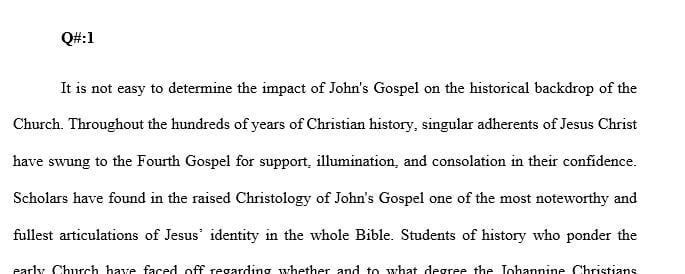Evaluate the arguments for and against the traditional views of the authorship of the Gospel of John.
1. Evaluate the arguments for and against the traditional views of the authorship of the Gospel of John. Describe the role of the Beloved Disciple and his relationship to the Fourth Gospel.
2. What are some of the major differences between the Gospel of John and the Synoptic Gospels? Briefly describe a few events and teachings in Jesus’ life that are not found in the Gospel of John.
3. How does John’s use of the Greek term logos connect Jesus with the creation account of Genesis 1 as well as the Greek principle of cosmic Reason?
4. Why did the writer of the Gospel of John compile a “Book of Signs”? briefly describe one of those signs and its meaning.
5. What does the author of John’s use of the Holy Spirit indicate about Jesus’ presence? What is the role of the Holy Spirit in the Johannine community? What are some other names for the Holy Spirit?
6. Compare the account of Jesus’ trial before Pilate with that of Paul before Pilate’s successors, Felix and Festus.
7. Identify the leaders of the Jerusalem church and the missionaries who first helped carry “the new way” into the larger world beyond the Jewish capital.
8. In recording the events of Pentecost how does Luke emphasize role of the Holy Spirit and that Christianity is a religion for all peoples? According to the author of Luke, what ancient Hebrew prophecy is fulfilled by the Spirit’s coming upon the first disciples?
9. Summarize the events that led to the expansion of Christianity from Jerusalem into Judea and Samaria. Include in your description the role of Stephen and Philip.
10. Summarize the results of Paul’s three missionary journeys into Gentile territories. What series of events led to Paul’s arrest in Caesarea and Rome?
11. Briefly describe Paul’s transformation from a zealous Pharisee to Christianity’s first great missionary. How does the account of his conversion in Acts ch. 9 differ from his own accounts in Gal. 1:15 and I Cor. 9:1 and 15:8-9?
12. What is the evidence in Acts and Paul’s letters that there was approximately 17 years between Paul’s conversion and the council in Jerusalem? What two references in Acts and Paul’s letters help us place his life and ministry in historical context?
13. How many authentic letters of Paul are there? How many disputed and/or pseudonymous letters of Paul’s exist and what generally distinguishes the authentic letters from the disputed/pseudonymous letters.
14. Briefly describe Paul’s mysticism and eschatology and explain their connection.
15. List the ways in which Jesus is central to Paul’s theology and briefly describe one of those ways, giving appropriate detail.
Answer preview to evaluate the arguments for and against the traditional views of the authorship of the Gospel of John.
MLA
1731 Words


